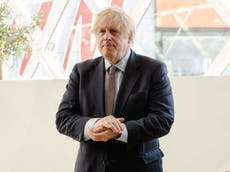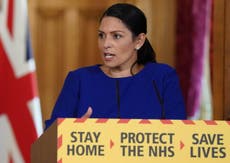Boris Johnson’s overseas aid decision smacks of contempt for British ambitions – and will make us and the world poorer
To be frank, this decision was no surprise to those who have watched the takeover of the Conservative Party by the ideological right wing

Boris Johnson’s announcement of the absorption of the Department for International Development (DfID) into the Foreign Office was as brutal as it was abrupt.
Let us be clear, the language Johnson used marks the end of the world leading development agenda forged by DfID over more than two decades under, Labour, coalition and Conservative governments.
His description of the UK’s development budget as “some giant cashpoint in the sky” shows at best a complete lack of understanding of the complexities and sophistication of delivering world class development programmes. At worst it shows contempt for DfID’s reach, ambition, and achievement.
Of course, aid and development and foreign policy considerations should be coordinated but having two complementary departments is no obstacle to that. The two secretaries of state are ex officio members of the National Security Council. In those countries where the UK is delivering bilateral programmes, in almost all cases DfID the embassy or high commission are co-located.
The government proposes that all aid decisions will be taken by the Foreign Secretary and implemented on the ground by the British ambassador and trade commissioners, who have no training or experience in procuring or delivering development programmes. Will DfID staff, with expertise in building health systems, girls’ education, support for the disabled and much more, be reduced to mere advisors?
Johnson’s comparison of UK aid to Zambia and Tanzania with Ukraine and the western Balkans is revealing. Does the UK really want to reduce its commitment to former British colonies with whom we have historic ties and, many would argue, responsibilities?
Comparing these proposals with the practice in Australia, New Zealand and Canada is unfortunate as these countries have smaller economies and aid budgets well below 0.7 per cent. Indeed, New Zealand no longer identifies aid spending separately and critics cynically rechristened the Australian development agency Aus Aid to “Was Aid” after it was absorbed into the foreign ministry and downgraded.
I was also deeply concerned that the impact of Covid-19 was not mentioned in the statement, yet the plight of the world’s poorest people will intensify in its wake. Turning inwards to subordinate the beacon to the world, which British development assistance has become, to domestic foreign policy, in a desperate bid to secure influence and trade deals, will weaken the drive to poverty reduction and the sustainable development goals.
To be frank, this decision was no surprise to those who have watched the takeover of the Conservative Party by the ideological right wing, backed by the anti-development rhetoric of their cheerleaders in the press.
It is a particular irony on the day that Boris Johnson reversed the decision to remove free school meals from the poorest in our society that he effectively snatched way meal vouchers for some of the poorest children on the planet.
Yet I take heart that it has been greeted with dismay, not just by those who see the UK’s global leadership on aid as a source of pride and a triumph of soft power, but by many in the Conservative Party, not least the former prime minister, David Cameron and former DfID secretary, Andrew Mitchell, who reformed DfID and radically sharpened its effectiveness.
If that is the reaction of some in the Conservative Party, then there is certainly a coalition of support that can and must be formed to ensure we protect international aid and force the prime minister to think again.
If we don’t, the world will be poorer because of this decision and so will the United Kingdom whose influence and standing in the world will be further reduced.
Lord Bruce of Bennachie chaired the International Development Committee from 2005 and 2015 and is a former deputy leader of the Liberal Democrats






Join our commenting forum
Join thought-provoking conversations, follow other Independent readers and see their replies